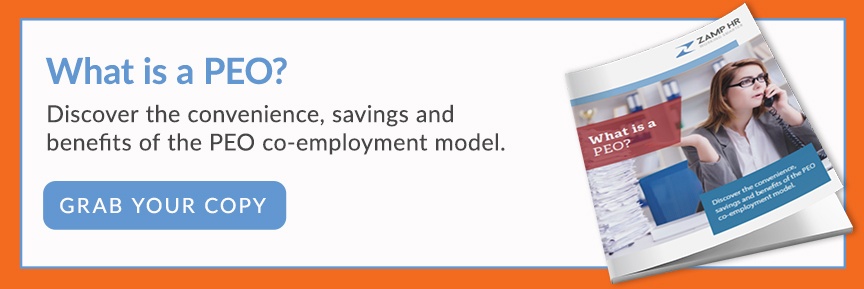Running a business is inherently risky. The risks you face vary wildly but might include natural disasters, loss of a vital supplier, issues with the supply chain, high employee turnover, etc.
Managing these risks is part of doing business. It's impossible to eliminate all risks, but you can mitigate them. One good way to do so is by partnering with a Professional Employer Organization (PEO), which can help with risk avoidance, reduction, sharing, and retention. Using a PEO for risk management services can help you address these HR-related risks.
Why Outsource Risk Management?
Risk management can be time-consuming and expensive. Outsourcing can help by freeing your time up to do other stuff. Here are some of the benefits of outsourcing your risk management to a PEO:
Cost-Effectiveness
Having an in-house risk manager might seem like a smart choice, especially with the amount of work needed. However, by outsourcing to a third party, you can get higher levels of expertise and, importantly, multiple eyes on a matter. Instead of having one person, who may not have the skills needed, you have access to an entire team of experts, paying for the amount of their time you use.
Safety
Even industries that don't usually talk about safety need to discuss safety requirements. Having a world-class safety program requires significant expertise, and hiring a safety consultant has a lower ROI than generally outsourcing risk management.
A PEO can provide you with the experience needed to design the proper safety program and training for your business and help you with signage, etc, to ensure that the program is followed.
Compliance
Regulatory compliance alone is a full time job, especially if you have employees in multiple states. However, most businesses can't afford a full time compliance officer.
Outsourcing risk management gives you access to their expertise. They can help you stay compliant with all federal, state, and local regulations.
Also, you are not relying on the knowledge of one compliance officer but have access to an entire team.
Growth
How much time do you spend worrying about risk? With outsourced risk management, you and your employees can instead focus on core business duties. Your HR team can spend their time building a company culture and working on attracting the talent you need for your business to thrive.
Independent Review
How honest are your employees when they bring you their concerns? No matter how much you try to create a transparent atmosphere, there will always be a tiny amount of intimidation associated with talking to "the boss."
Outsourced experts are more likely to provide you with the kind of blunt, direct analysis you need to fix your business's problems and make your risk management more effective. Their job is to help you secure your business, and you can trust them not to be yes men.
Why Outsource to a PEO?
Outsourcing to a PEO in particular gives many benefits. As the most comprehensive form of HR outsourcing, it has an average ROI of 27.2%. In addition to, outsourcing to a PEO:
- Helps ensure HR compliance. PEOs have the expertise to handle all of your compliance needs ranging from Family and Medical Leave Act to Americans with Disabilities Act.
- Optimizes workers' compensation. This means things like making sure all of your workers are correctly classified, that you have a solid claims management process, and designing a return to work program to reduce the cost of claims.
- Manages unemployment claims. This is a huge administrative burden that can result in significant financial risk if done incorrectly.
- Performs onsite safety consultations to ensure that you are not merely meeting compliance standards, but providing the highest level of safety to your employees and visitors.
- Maintains error-free payroll, reducing compliance risk and turnover.
- Consults on employee relations to help you with hiring, discipline, and firing strategies that will ensure compliance and help support cultural fit.
Most of these risks are related to HR either directly or indirectly, but the complex bucket of HR risks is one which needs to be prioritized. This is on top of all the other things a PEO can do for you like help you afford better health insurance for your employees and compete for talent on a more level field.
How do PEOs Deal with Risk?
PEOs deal with risk at a number of levels:
Risk Avoidance
Not all risks can be avoided, but some can. Safety audits and frank, candid conversations with HR can reveal what risks might be present in your company that can easily be avoided. For example, an audit might show that your drivers are using their cellphone while driving, and this can be addressed with training and potential discipline.
Risk Reduction
Safety audits can also reveal holes in your safety training and help you create a good safety policy. This reduces the risk of accident or injury. PEOs can also reduce risk by administering workers' comp and unemployment claims in a streamlined and optimized manner. Invalid claims can inflate your insurance premiums, as can claims which are unnecessarily large because you did not provide the right accommodations to allow an employee to return to work.
Risk Sharing
PEOs use a legal mechanism called co-employment to make themselves the employer of record for your workforce. This means that your employees can be added to their health insurance and workers' comp policies.
This shares the risk across multiple companies. Not only do economies of scale and expert negotiators help you get lower premiums, but the larger pool means that any given claim raises your premiums less. Smaller companies can use this to get the kind of prices usually offered only to Fortune 500 companies. You can provide much better health insurance coverage, which also reduces the risks of sickness and absenteeism.
Risk Retention
It might seem that you don't want to retain any risk. However, we don't live in a perfect world. Even after implementing these polices, you will still have HR-related risks.
A PEO can help you understand what risks are a normal cost of doing business and cannot be mitigated further. For example, you can never completely eliminate the risk of an employee lawsuit.
PEO Risk Management vs. Payroll Risk Management
Many companies choose to outsource only payroll, as the most time-consuming part of HR. However, these dedicated companies can only manage risks related to payroll, such as payroll compliance or payroll errors. PEOs do this and all other HR risks. The more comprehensive your HR outsourcing, the more risks you can avoid, reduce, and share.
Outsourcing to a PEO is the best way to get comprehensive HR outsourcing, a good ROI, and maximize your management of risk.



